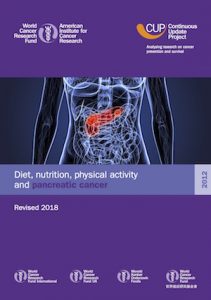Pancreatic cancer is a relatively rare cancer compared to breast, colorectal, prostate, and lung cancer, but it is highly aggressive and expected to claim the lives of more than 44,000 Americans in 2018. The lack of reliable screening tests, the indeterminate symptoms and the relative rarity of pancreatic cancer mean that it is often not diagnosed until the disease is at an advanced stage. But even when diagnosed early, it has a poor prognosis – only about 8 percent of people who develop pancreatic cancer survive longer than five years. Findings from a recent study published in the European Journal of Clinical Nutrition suggest that diet may play a key role in preventing pancreatic cancer.
The study investigated links between pancreatic cancer risk and intake of certain nutrients involved in a process called methyl-group metabolism.
“Methyl-group metabolism is essential for DNA synthesis and methylation,” says Jianjun Zhang, MD, PhD, an associate professor of epidemiology at the Indiana University Fairbanks School of Public Health and the senior author on the study. Methylation is a process in which chemical clusters called methyl groups are added to a DNA molecule. It may be related to tumor formation and growth.
Key nutrients in methyl-group metabolism include folate, vitamins B6 and B12 and methionine, a type of amino acid. The population-based case-control study was conducted in Minnesota and involved more than 600 participants, including pancreatic cancer patients and their age-, race-, and sex-matched controls. The average age of the participants was approximately 66 years.
Folate is a water-soluble vitamin found in green leafy vegetables, beans, nuts, and fruit. Vitamin B6 is present in many foods, including fortified cereals, beans, poultry, fish, and some vegetables and fruits, especially dark leafy greens, papayas, oranges, and cantaloupes.
Because diet and other lifestyle factors play key roles in the development of pancreatic cancer, the researchers gathered information regarding the participants’ health histories (such as whether they had diabetes), socioeconomic status (such as education) and lifestyle factors (such as physical activity levels and whether they smoked).
Each of the participants completed a food-frequency questionnaire that gauged their intake of foods rich in folate, vitamins B6 and B12, and methionine. The researchers placed the participants into one of four groups, based on their intake, ranging from low to high. The participants with the lowest intake served as a reference group against which the other groups were compared.
Then the researchers performed a statistical analysis to estimate pancreatic cancer risk in relation to intake of the individual methyl-related nutrients across the four groups of participants. They also estimated risk based on combined folate and vitamin B6 intake, since these two nutrients work together in methyl-group metabolism, says Zhang.
Their findings revealed that dietary intake of folate alone was linked with lower risk of developing pancreatic cancer, even after taking into account demographic, health, and lifestyle factors. Participants who had the highest intake of folate had a 69 percent lower risk compared to those with the lowest intake. Vitamin B6 intake alone was not linked to pancreatic risk. But when the two nutrients were considered together, high intake of folate and vitamin B6 was linked with a 76 percent lower risk of developing pancreatic cancer.
The findings from this study suggest that dietary intake of folate and vitamin B6 may protect against pancreatic cancer, especially when the two nutrients are considered together.

However, the AICR/WCRF Continuous Update Project Report on pancreatic cancer concluded that the evidence for folate in reducing pancreatic cancer risk was “Limited.” While this study adds to the global research in this area, it is important that the overall evidence is considered, especially since high folate intake may increase the progression of existing cancer or premalignant conditions. AICR recommends obtaining all nutritional requirements from whole foods and does not recommend using supplements for cancer prevention.
Folate is a water-soluble vitamin found in green leafy vegetables, beans, nuts, and fruit. Vitamin B6 is present in many foods, including fortified cereals, beans, poultry, fish, and some vegetables and fruits, especially dark leafy greens, papayas, oranges, and cantaloupes.
Zhang and his colleagues’ next research will build on the findings of this study. “In the future, we will measure plasma concentrations of folate and vitamin B6 as biomarkers of intake of these nutrients,” says Zhang. Biomarkers often provide more reliable assessments of dietary intake than food-frequency questionnaires.
AICR recommends following a cancer-protective diet that is rich in folate, vitamin B6, and other nutrients to reduce cancer risk. More information about pancreatic and other types of cancer can be found on AICR’s Cancer Sites page.






Good to hear this, then we’re up for a B6 food hunting.
Thank you so much for sharing such a wonderful info that was a though provoking content .I enjoyed a lot for reading your content.